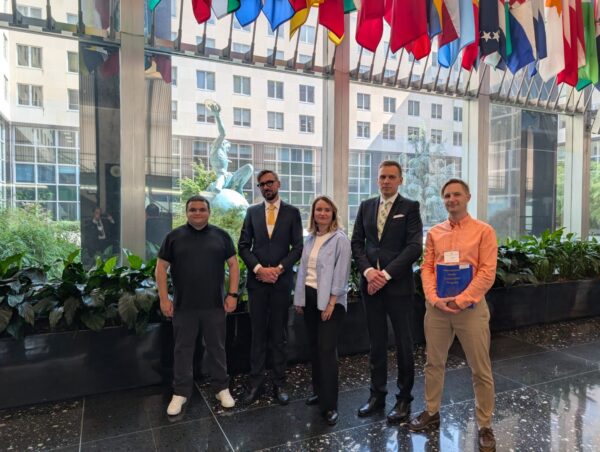Economic Prosperity: Artificial Intelligence and Technology Entrepreneurship

Amid rapid technological transformation, artificial intelligence (AI) is reshaping industries, economies, and societies. To build resilient and ethical innovation economies, international collaboration is key. Through the International Visitor Leadership Program (IVLP), five technology and entrepreneurship professionals from Belarus explored the U.S. innovation landscape with a focus on AI, startup acceleration, and public-private partnerships. Over the course of three weeks, participants engaged with leaders from government, academia, and the private sector to exchange strategies for driving economic prosperity through responsible tech development.
Project Objectives
- Examine U.S. approaches to AI governance, innovation policy, and ethical frameworks for emerging technologies.
- Explore models for startup growth, university-led commercialization, and venture funding.
- Strengthen understanding of regional and federal mechanisms that support digital entrepreneurship.
- Foster dialogue on cybersecurity, workforce training, and cross-sector collaboration in AI deployment.
Project Design
Over three weeks, participants traveled across five U.S. cities and regions to understand the diverse and decentralized nature of American innovation.
Washington, DC & Baltimore, MD: The program launched in the U.S. capital with a deep dive into federal structures, entrepreneurial policy, and AI-enabled economic growth. Through meetings with the U.S. Department of State, U.S. Patent and Trademark Office, and congressional staff, participants examined the evolving regulatory and policy landscape surrounding AI. At the 2025 AI+ EXPO, they connected with leaders from cutting-edge firms focused on topics including national security, autonomous systems, and agentic architecture. In Baltimore, the group explored state-backed innovation models at TEDCO and gained insight into Maryland’s investment strategies to grow early-stage startups. Participation in the Techstars AI Health Demo Day exposed visitors to the competitive world of investor pitching.
Pittsburgh, PA: At Carnegie Mellon University’s Center for Machine Learning in Health and Swartz Center for Entrepreneurship, participants learned how academic research is translated into real-world AI applications. Visits to LifeX Labs and Idea Foundry highlighted how the region supports commercialization, attracts global partnerships, and builds sustainable startup ecosystems.
Iowa City & Cedar Rapids, IA: In Iowa, the group shifted focus to grassroots innovation and community-based entrepreneurship. They joined EntreFest, the state’s leading entrepreneur conference, where they moderated sessions on AI integration in small business, access to capital, and the future of venture funding. University of Iowa’s Tippie College of Business hosted an immersive session on VR tools for workforce development—bridging AI innovation with upskilling and economic inclusion.
Raleigh, NC: North Carolina’s research triangle provided the ideal setting to conclude the program with a forward-looking focus on AI literacy, ethics, and cybersecurity. At North Carolina State University and the NC Department of Information Technology, participants examined state-level frameworks for AI regulation and public education. A culminating session with AI Innovation Consultant Adam Covati offered time for reflection, knowledge synthesis, and future planning.
Impact and Next Steps
Participants returned to Belarus equipped with fresh insight, cross-sector connections, and practical models for scaling innovation.
In the coming months, participants are expected to:
- Launch regional working groups to discuss AI ethics and responsible innovation among Eastern European tech entrepreneurs;
- Pilot university partnership models to expand research-to-market pathways for AI startups;
- Promote digital upskilling programs using immersive tools introduced during the U.S. program.
Project summary
| Economic Prosperity: Artificial Intelligence and Technology Entrepreneurship | |
|---|---|
| Number of Visitors: | 5 |
| Regions: | Europe and Eurasia |
| Countries: | Belarus |
| Impact Areas: | Science and Technology, Entrepreneurship |
| Program Areas: | Global Leadership |